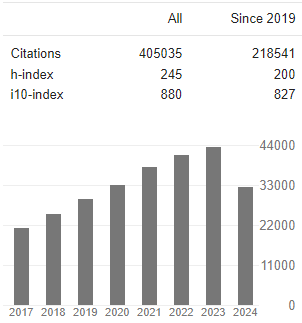Proof of the Collatz Conjecture Using Logical and Probabilistic Approaches
Abstract
Xinyi Zhou
Almost 100 years ago, the Collatz problem was introduced by German mathematician Lothar Collatz in the 1930s. It provides a predefined transformation algorithm to deal with any starting numbers in the Collatz process which are positive odd or even integers: for odd numbers, multiple it by 3 and add 1 and for even integers, divide it by 2. The Collatz conjecture states that after enough times of repetition all the natural starting numbers would eventually decrease and converge to 1. Although the Collatz conjecture has been verified to be true below a very high numerical threshold, until this day, no rigorous mathematical proof could be made which is the main focus of this research paper. After we have shown that no infinite loop could exist besides the trivial loop of 1→4 →2→1 and that no positive integer within the Collatz process would diverge to infinity, we firstly put through our proof of the Collatz conjecture using logical arguments before we support the latter results by proving the conjecture using a probabilistic approach.





